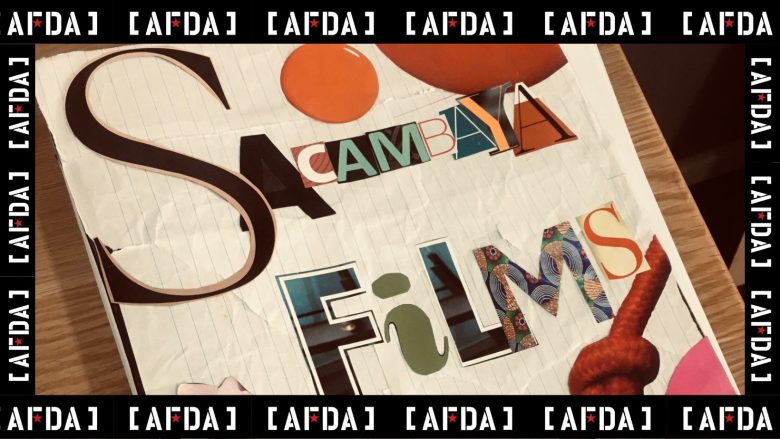The following components were needed for the Writing Treatment for our Honours Film:
1. Research and generate in writing an Engaging Narrative Concept for the screenplay
2. Generate in writing visible and dynamic Event Development for the Narrative
3. Research and generate in writing relevant and credible Character Development for the Narrative
4. Research and generate Poetic Amplification for the delivery of the narrative in the cinematic medium
*
1. Engaging Narrative Concept
1.1 Logline
In the crime-ridden streets of Port Elizabeth, a taxi driver and his hearing-impaired brother plunge into a dangerous life of crime, battling to protect each other and hold on to their fading morality.
1.2 Synopsis
In the bustling streets of Port Elizabeth, 19-year-old Themba navigates a tough life with the help of his brother, Aphiwe, a street-savvy taxi driver. The film opens with a vivid portrayal of the chaotic city, setting the stage for their struggles. When Themba is violently mugged, losing his phone and hearing aid, his frustration strains their bond.
Aphiwe’s criminal dealings with Cebisa, a desperate young woman caring for her ill father, take a dark turn when she kidnaps a local taxi influential figure, Gobela. The situation escalates in an abandoned warehouse, where Cebisa’s ruthless methods clash with Aphiwe’s moral hesitation, the stress causes Cebisa to shoot Gobela and she soon after goes into emotional turmoil from her first kill. Themba bravely intervenes, despite having lost his hearing in an attempt to save his brother.
The film concludes with Themba and Aphiwe conquering Cebisa in a thrilling fight leaving Cebisa dead and Themba badly injured. Themba drives away in shock at their struggle for survival.
1.3 Dramatic Tension & Issue
The overall plot for this film is morality versus crime. The world of story focuses on the fight against greed among taxi owners, taxi businesses, and the urge to gain government tenders.
This thriller film will also focus on the issue of Themba being deaf, and that it is not a limitation nor a disability. The tension in the film will escalate when the following questions arise: How far is one willing to go to get what they want? And how far are they willing to go for family?
1.4 Target Audience
The primary target group consists of the following:
Age: 25-55 Years | Gender: Male & Female | Language: English, Xhosa | Income Level (per month): R45 000- R200 000 | Education: Higher Education | Occupation: Educators | Enjoy learning | Aim to improve the world
The secondary target group is as follows:
Age: 16-30 Years | Gender: Male & Female | Language: English & Xhosa | Income Level (per month): R12 000 – R50 000 | Education: Lower & Higher Education | Occupation: Learners, Artists, Work Corporate Businesses | Audience enjoys suspense | Critical thinking
1.5 Engaging Narrative Concepts
Themba, the protagonist, wants independence. His need is to learn that he can’t control everything, while his flaw is that he is selfish. He also panics uncontrollably under stress, and can’t handle his emotions. His character arc is that he starts dependent, and then becomes independent as the film progresses. He is first a passenger and ends up in the driver’s seat.
Aphiwe, the supporting character, wants to save his family and have economic freedom and security. His need is to know that he can’t save everyone. His flaw is that he thinks he can save everyone, and he can’t handle being controlled. He also uses physical aggression to defend himself. His character arc is that he goes from being the savior to being saved in the end.
Cebisa, the antagonist, wants equality in the taxi business. Her need is to let go of her father, and her flaw is a lack of self-control. She is also impulsive and comes off as arrogant. Her character arc is that she starts as boldly self-assured, but ends up vulnerable and weak.
1.6 Binary Code
The protagonist, Themba, will have a conflict between individualization versus community. The antagonist, Cebisa, will focus on equality versus crime. The supporting character, Aphiwe, will showcase security versus crime.
1. 7 Specific Relevance
The conceptual relevance is the struggle for survival, whereas the emotional relevance is family and relationships. The fear of losing a loved one is addressed in this film. Self-actualization is also portrayed, where each character realizes something new about themselves.
The overall theme of the film will show what it looks like to take control of one’s life, and the sub-themes are family and the struggle for survival.
1.8 Audience relationship
The audience will be exposed to the fact that being deaf is neither a disability nor a limitation.
2. Narrative Event Development (2.1 Three-Act Structure)
ACT 1
In the busy downtown terminus of Port Elizabeth, Themba, a young construction worker man, emerges from a taxi driven by his brother Aphiwe, a well-dressed driver adorned with jewelry. The chaotic montage scene around them contrasts with their routine interaction, setting the stage for the story. Themba’s cochlear implant hints at his hearing impairment, adding a layer to his character.
Act One begins with Themba’s daily life. He works hard, commuting between his job and home, while Aphiwe, his supportive brother, ensures his safe travel. Their bond is strong. Meanwhile, Cebisa, a determined woman, confronts Gobela, a corrupt businessman tied to a chair in her garage. She reads a document awarding Gobela’s company a lucrative contract and expresses her anger at his greed, setting up a sub-plot of revenge and justice.
The first turning point occurs when Themba is violently mugged at a bus stop, his cochlear implant destroyed in the struggle. Aphiwe tries to intervene but fails, leading to a confrontation between the two brothers. Themba blames Aphiwe for his misfortune, creating a rift in their relationship. This incident not only escalates the tension but also propels Themba into a new direction, filled with anger and frustration.
ACT 2
Act Two establishes Cebisa’s reasons for her behavior as she says a prayer with her sick father in his bed. Cebisa aims to bring justice to what she and her dad have been fighting for.
The story delves deeper into the conflict. Cebisa and Aphiwe collaborate to extract money from Gobela. They kidnap him, taking him to a warehouse for a tense interrogation. Aphiwe, torn between his protection over Themba and his involvement with Cebisa, tries to mediate but struggles to keep control. Meanwhile, Themba, unknowingly caught in the middle, discovers the brutal scene in the warehouse. His silent presence adds an element of suspense, as he navigates the dangerous situation.
The second turning point arrives when Cebisa’s frustration peaks. She points a gun at Gobela, ready to execute him for his betrayal. Aphiwe attempts to reason with her, highlighting the gravity of their actions. However, Cebisa, driven by rage, shoots Gobela, shocking Aphiwe and sending Themba into hiding. This act of violence marks a significant shift in the narrative, pushing the characters towards an inevitable confrontation.
ACT 3
Act Three reaches its climax when Themba, having witnessed Gobela’s murder, decides to act. He tries to escape the warehouse but is spotted by Gobela, who signals his presence to Aphiwe and Cebisa. Aphiwe, now fully aware of the danger, confronts Cebisa, resulting in a heated argument and a struggle for control. Themba, seizing the opportunity, attempts to free himself from the chaos.
In the showdown, Themba and Cebisa engage in a brutal fight. Themba, driven by fear and anger, overpowers Cebisa, leaving her severely injured. He then turns his attention to Aphiwe, who is gravely wounded. In a moment of emotional reconciliation, Themba helps Aphiwe into the taxi, determined to escape the grim scene.
The story concludes with Themba driving the taxi away from the warehouse, Aphiwe by his side. The once vibrant and bustling city now feels distant as they navigate the aftermath of the violence. Themba’s actions have altered his life irrevocably, leaving him to contemplate his future amidst the silent echoes of their shared ordeal. This resolution highlights themes of taking control of one’s life, the struggle for survival, and family.
3. Narrative Character Development (3.1, 3.2 & 3.3 is addressed below)
Themba (Protagonist)
Age: 19 y/o
Class: Lower Class
Physical Appearance: Short, black
Race: Xhosa
Style: Wears whatever he finds in the closet.
Personality: Introverted | Can be clumsy/make dumb decisions under stress | Well-mannered | Often drifts into own world | Confident | Creative
View of the world: The world is a cruel place
General life goal: Music producer (external goal) | To prove people wrong (internal goal)
Value: Peace
Flaws: Panics under stress | Can’t handle his emotions | Selfish
Beliefs: Christian | Dreams can come true
Hobbies: Reading | Music | Walking | Learning
Communication: Deaf (uses cochlear hearing aid) | Can’t communicate through sign language
Intelligence: Smart
Relationship with parents: Never knew his mom, his dad died when he was young | Aphiwe is his mother, brother, and dad all in one, it’s all that he has.
Job: Construction worker
Character Arc: Story arc: Themba goes from being a passenger to the driver. “Taking control of one’s life”
Character Want in story: Independence
Character Need in story: Learn that he can’t control everything
Aphiwe (Supporting)
Character reference: Generations series: Mrekza character
Age: 28 y/o
Class: Lower class
Physical Appearance: Tall, light-skinned, bald, has a beard
Race: Xhosa
Style: Clean | Neat, branded clothes | Shinny jewelry
Personality: Takes pridTe in appearance | Talkative: Kindly manner | Positive | Like telling stories | Childlike & Playful | Careless and knows it. “I am the man with the plan” | Responsible | Justifies himself (tells his life story a lot, even when not asked)
View on the world: Sees opportunities in life, positive view | ‘You only live once’
General life goal: Get a family, buy a house, get a wife | Loves to have family
Value: Family
Flaw: Thinks he can save everyone | Does not like to be controlled, uses physical aggression to defend himself
Beliefs: Christian | Giving is better than receiving
Hobbies: Likes eating & snacking | Smoker | Soccer & beer is his favorites
Intelligence: Street smart | Finished school in grade 10
Relationship with parents: Lost his parents young and had to take care of Themba | Angry at parents for leaving him & Themba alone. Never healed from their death.
Background: After losing his parents in a car accident, he left school & started working wherever he could get a job. Met Cebisa’s dad when he was 18 and has since been working for that family.
Job: Taxi driver
Character Arc: Savior to Saved
Character Want in story: To save family | Economic freedom (security)
Character Need in story: To know he can’t save everyone
Cebisa (Antagonist)
Age: 25 y/o
Class: Middle Class
Physical Appearance: Short, dark-skinned, dreads, skinny
Race: Xhosa
Style: Simple dressed
Personality: Confident | Classy | Caring | Daring, bold | “Resting bitch face” but is kind | Sarcastic | Over-thinker
View on the world: Life is not fair, no equality | The world revolves around her
General life goal: Equality for all (Film reference: Mlungisi female black character)
Value: Security | Time (Time is money in her world)
Flaw: Lack of self-control | Impulsive | Confidence may seem like arrogance
Beliefs: Spirituality | You can control your life | Christian
Hobbies: Gyming | Politics | Reads a lot
Intelligence: Smart
Relationship with parents: Cebisa’s dad has always advocated for equality in the taxi business now on his deathbed, Cebisa sees that he has lost control of his life. Cebisa takes it upon herself to see that equality is dealt with by killing a taxi boss.
Job: Taxi advisor
Character Arc: Boldly self-assured to vulnerable and weak
Character Want in story: Equality in the taxi business
Character Need in story: Letting go of her father
4. Cinematic Expressions & Poetic Amplifications
In the first few minutes, the physical environment of Themba’s world is established. A busy downtown terminus rank is seen. Crowds of people are seen climbing and leaving taxis. Also, the air is thick with smoke. Tall old buildings surround Themba’s outside world. Street vendors sell food, clothes, and jewelry on the street.
Inside the taxi at the warehouse, the physical use of the warehouse and taxi is clearly described in the script and used as a backdrop for the tensions between the three main characters.
As for the acoustic environment, the sound of the taxi’s whistling and shouting can be heard, a radio announcement is made, cars driving by are heard from the freeway, and the world is louder and heightened as we experience Themba’s world. When Themba’s hearing aid is stolen and crushed, the acoustic sound becomes quiet. We then experience Themba’s world in real-time.
In the warehouse, the sounds of the environment can be heard through strange vibrations, keeping us in Themba’s world. The heated conversations between Aphiwe and Cebisa are loud and angry and add an element of suspense to the story.
The dialogue between Themba and the robbers is Xhosa, and local slang is also used, making the conversations authentic. Swear and cuss words are also authentic to the South African language.
Use of South African Sign Language (SASL) is also used in conversations between Themba and Aphiwe. Themba, who is deaf, will also speak with a deaf accent where there is spoken sound.
The “Port Elizabeth” and “Port Elizabeth Harbor Ahead” signs are shown in the beginning to establish the city and country where the film takes place.
Jumping between past and present scenes brings in the element of the thriller, letting the audience feel the anxiety and stress of Themba’s world of sound versus silence.
After Themba’s hearing aid is crushed, he is in a fetal position. We are then transported into real-time, where Themba is in a warehouse and curled into a fetal position again. We realize it is a flashback into a traumatic memory for Themba, and the transition is seamless.
Themba’s point of view and Aphiwe’s world also transitions from one scene to another, as both take place inside the taxi.
*
This short film will have its premiere launch in November 2024 at the Graduation Festival in Port Elizabeth.



